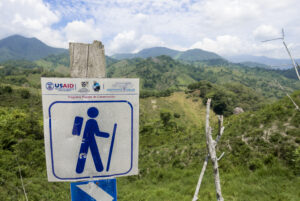In this document, WOLA outlines human rights arguments for not supporting the Colombia FTA. Solo disponible en inglés
Why should Colombia’s human rights record enter into debate about a trade agreement?
- Colombia is widely recognized as having one of the worst records on human rights protection in the Americas. Passage of a trade agreement will eliminate any leverage the U.S.U.S. governments signed the trade agreement in November 2006, rates of killings by security forces and rightist paramilitary groups that have been linked to government officials are reported by some sources to have declined. But the numbers are still very high, and progress has not warranted passage of an agreement that would create the highest level of economic integration between the two nations’ economies. Attacks against human rights defenders, trade unionists, indigenous leaders and many other groups continue with impunity. In only the first 11 days of March 2008, four trade unionists were killed. That same week human rights groups had their offices ransacked and their equipment stolen. Since the beginning of 2008, a total of 12 trade unionists have been killed. In addition, extrajudicial executions are occurring at an alarming rate, with recent cases reported in the areas of Valle del Cauca, Cauca, Meta, Putumayo and Nariño. Since the beginning of March, numerous national and international human rights organizations have received death threats from a notorious paramilitary group, the Black Eagles.
Will the trade agreement improve the plight of Internally Displaced People in Colombia?
- With an estimated 3.8 million internally displaced persons (IDPs), Colombia contains the second largest IDP population in the world, after Sudan. People have been displaced due to the armed conflict and forced off land by powerful economic interests. Afro-Colombians and indigenous populations account for a disproportionate number of the total IDP population, with an estimated 79% of Afro-Colombians who lived on collective territories being forcibly displaced from them. WOLA believes that passage of a trade agreement is likely to accelerate violent land expropriation to benefit agro-export crops such as palm oil, which would benefit from the trade agreement. WOLA also believes that the high levels of violence and impunity that characterize areas where forced displacement has occurred would make any other economic activity in these areas extremely difficult. Before a trade agreement is approved, the Colombian government must take more concrete steps to prevent and protect people from displacement and to protect the rights of those displaced.
Will the Colombia trade agreement reduce poverty?
- WOLA believes that any trade agreement with Colombia must make the reduction of poverty and improving the livelihoods of the most vulnerable sectors as important as the trading of goods. In Colombia, 65% of the population lives below the poverty line. In rural areas, that figure reaches 80%. Under the proposed trade agreement, Colombia will cut tariffs on many basic agricultural goods and open its markets to heavily subsidized U.S. agribusiness imports. Similarly, duty-free access to the United States for cut-flowers and other agro-export products will encourage agribusiness plantations to increase production for export. Both agribusiness expansion and imports of agricultural goods will displace rural Colombian workers from their lands, worsening unemployment and poverty levels. This trade agreement will hurt the rural poor and has no mechanism designed to prepare them for competition with cheaper subsidized goods produced by U.S. farmers.
Will the trade agreement strengthen local and regional development?
- Foreign direct investments can be a critical tool in stimulating local and national development. However, like other trade agreements before it, the Colombia agreement prioritizes protections for foreign investors over domestic development needs, weakening the government’s ability to determine and implement national development strategies. “National Treatment” provisions stipulate that governments treat foreign investors at least as well as domestic ones in government procurement bids. Consequently, the government will be unable to favor established or nascent industries with ties to local communities. Nor will the government be able to impose performance requirements which force foreign investors to create forward and backward linkages within a country’s economy, purchase supplies locally, or employ specific populations such as women or Afro-Colombians. WOLA believes that national needs must take priority over foreign investment rights, and the government must retain the policy flexibility necessary to determine the development strategies that its country needs.
Will the Colombia trade agreement strengthen democracy?
- The Colombia agreement includes the same controversial Investor-State Dispute Mechanisms included in NAFTA and other trade agreements. As drafted, the dispute mechanism allows foreign corporations to sue for perceived violations of their rights and loss of future profits. Foreign investors can demand compensation when, for example, public-interest laws prevent them from conducting business or when a community democratically decides not to allow a business practice in their area. Since NAFTA’s implementation, investors have used this provision to challenge public interest laws and local governance processes. An example of a law that would be threatened is the 1993 Law 70 in Colombia which mandates that government invest in the socio-economic development of Afro-descendants and protect their cultural identity and civil rights in order to preserve their ancestral territories. Decades of violence and corruption have already severely undermined democracy in Colombia. WOLA believes that any trade agreement must guarantee legitimate democratic practices and safeguard laws and regulations that protect all Colombians.
Will failure to pass the trade agreement pose a national security risk?
- At a March 2008 hearing in Congress, Admiral James Stavridis, head of the U.S. Southern Command, said: “As your national security adviser in that region, I will tell you that it is very important that the free trade agreement be passed from a national security perspective.” No one in Latin America doubts U.S. support for Colombia. But WOLA believes that there is not a national security rationale for passing the trade agreement with Colombia and that a strong argument to the contrary can be made. If this agreement follows the course of previous agreements, small agricultural producers will be displaced. Agriculture is the third most important sector in terms of employment. More than 20% of Colombian workers depend on agriculture for their livelihood, with higher figures for Afro-Colombians and indigenous peoples. The Colombian Ministry of Agriculture and Rural Affairs conducted a study of the effects of liberalization on nine primary agricultural products and found that full liberalization would lead to a 35% decrease in employment. (RCALCA resolution, December 12, 2005).
- Few question that the trade agreement would lead to displacement for many rural Colombians. What would happen to those displaced people? In February 2006, an editorial in The Washington Post warned that the “rural dislocation that would follow from ending all protection for Colombian farmers could undermine the government’s efforts to pacify the countryside. If farmers can’t grow rice, they are more likely to grow coca.” (The WashingtonFebruary 17, 2006, p. A18) In addition, forced displacement can contribute to individuals joining illegal armed groups, both on the left and right. In July 2004, the Colombian Minister of Agriculture addressed displacement and the potential impact of the trade agreement saying that “the FTA would give small farmers little choice but migration to the cities or other countries (especially the U.S.), working in drug cultivation zones, or affiliating with illegal armed groups.” Physical and economic displacement as a result of the trade agreement will cause greater problems for the Colombian government and invite even greater U.S. militarization in the region. Post,
Contacts:
202-797-2171
Gimena Sanchez, Senior Associate for Colombia, gsanchez@wola.org
Vicki Gass, Senior Associate for Rights and Development, vgass@wola.org
Additional Statements on the Colombia FTA
Senate Majority Leader Harry Reid
House Majority Leader Nancy Pelosi and Ways and Means Committee Chairman, Congressman Charles Rangel
Senator Max Baucus, Chairman of the Senate Finance Committee
Rep. George Miller, Chairman of the House Education and Labor Committee

